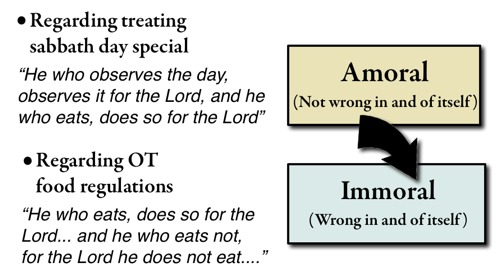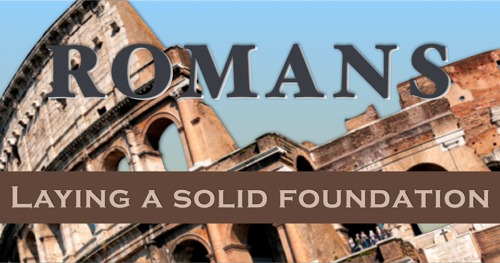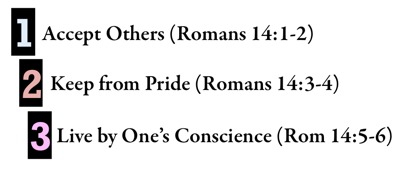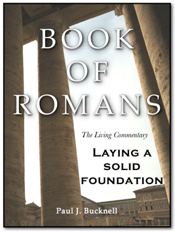
Romans: Laying a Solid Foundation
The Bible Teacher's Commentary
Paul J. Bucknell
on Romans 14:1-2
Paul J. Bucknell
Acceptance of Others
Romans 14:1-23 Intro | Romans 14:1-6 Conflict | Romans 14:1-2 Accept Others
Discerning Moral and Amoral Issues
Romans 14:3-4 Pride | Romans 14:5-6 Conscience
Romans 14: 7-12 Accountability | Romans 14:13-23 Love
Video Podcast | Bible Study Questions | Romans 14:1-23 Handout
Purpose
Romans 14:1-2 Acceptance of Others carefully sets out Paul's argument as to why we ought to accept one another despite our differences and different theological perspectives on amoral issues. Special focus on our different values is given. Part of The Bible Teacher's Commentary on the Book of Romans. Previous | Next
Accept Others (14:1-2)
"1 Now accept the one who is weak in faith, but not for the purpose of passing judgment on his opinions. One man has faith that he may eat all things, but he who is weak eats vegetables only.” (Romans 14:1-2).
The word ‘accept’ speaks of grace and kind treatment. It also has implications that believers should not judge or despise those who possess in their eyes an inferior faith. Each person must be respected for his own faith.
The Weak
The ‘weak’ are the ones who believe that it is proper and necessary to be vegetarian. They are not just thinking that it is a better diet but that it is morally correct (at least in light of the choices). In their minds this is one activity that defines a holy person.
The weak in faith is the one who is bound in his mind from having complete freedom with regards to eating all food and keeping days (or similar amoral issues).

This might be the Jewish person who refuses to eat pork. He could eat pork but believes he is gravely displeasing the Lord by eating pork due to his upbringing in Old Testament standards.
In their eyes, those who eat meat, or more probable, the meat that they consider unholy, are not living holy lives. Paul tells them they are right to refrain from eating meat if they indeed feel that way about the issue. As the chart shows, those amoral issues which are not really in and of itself wrong, become wrong to those when it is against their consciences.
This no doubt made this group content to some degree but probably not too much because they were described as ‘weak’. They have not grown to full maturity in belief (though they probably do think they have and wonder why the others have not caught up to them). They are to accept the others with differing principles (verse 3).
The Strong
Paul, however, also reprimands the way the ‘strong’ might mistreat the ‘weak’. The ‘strong’ believe it is fine to eat all sorts of food and in this case tend to look down on those who think it is okay to eat all things (probably those things not under the Old Testament law). They actually belittled the faith of those who did not accept their perspective.
In the chart below, we will show how conflict, faith, attitudes and needs relate to each other.

In Paul’s mind this is not a moral issue but only one in which some people think it is immoral. How does one keep harmony in unclear issues? We must remember that one’s attitude needs to be carefully governed at this point.
Coming to Different Values
Although there is some debate to the possible circumstances that Paul was alluding to, it seems that there is a consensus that the apostle was addressing the problems between the Jews and Gentiles in the congregations in Rome.
The church, being composed of many smaller congregations due to smaller buildings and less opportunity to travel across the city, necessarily were composed of those believers from various backgrounds that lived in that locality. Some were raised with one set of customs while others held others. They even perhaps shared different languages and foods.

It is important that we remember that the New Testament covenant had just replaced the Old Testament covenant back then. Those Old Testament dietary and sabbath laws were no longer in effect. They were in effect before for the Jewish believers but not once Christ with His blood initiated the New Covenant.
These Jewish and Gentile believers now were worshipping with each other outside of Jerusalem, in Rome in this case. They had mixed cultures and values.
Application
-
What are some issues in life that would be considered irrelevant (amoral) by some in your churches and very important (moral) by others?
-
How have ‘strong’ and ‘weak’ perspectives affected churches in your area?
Continue on to Romans 14:1-2 Discerning between Amoral and Moral Issues
BFF -> Moving our generation's heart and mind closer to the Lord through the powerful truth of God!


